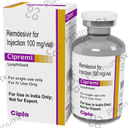Remdesivir
Uses
Remdesivir is used in the treatment of coronavirus disease (COVID-19).
How it Works
How Remdesivir Works Remdesivir is a broad-spectrum antiviral medication. It functions by inhibiting an RNA-dependent enzyme known as RNA polymerase, which assists the SARS-CoV-2 virus in replicating itself. By doing so, it reduces the viral load in the body.
Side Effects
Common side effects of Remdesivir include headache, rash, extravasation, increased prothrombin time, and elevated transaminase levels in the blood.
Expert Advice
- Remdesivir is indicated for the treatment of coronavirus disease 2019 (COVID-19) in hospitalized adults and children aged 12 years and older who weigh at least 88 pounds (40 kg).
- Renal and liver function should be monitored before and during treatment with Remdesivir, especially in patients with kidney or liver issues.
- Inform your doctor about all other prescription and over-the-counter medications, vitamins, and herbal supplements you are taking, as Remdesivir may interact with other medicines.
- Notify your doctor if you are pregnant or breastfeeding.
- After completing treatment with Remdesivir and your hospital stay, maintain a healthy lifestyle at home to facilitate a quicker recovery.
- COVID-19 can be life-threatening; however, it can be prevented by vaccination, wearing masks, and practicing social distancing wherever possible.
Related Medications
Remdesivir 100mg

₹4,500
Remdesivir 100mg

₹2,812.5
Remdesivir 100mg

₹2,700
Remdesivir 100mg

₹4,500
Remdesivir 100mg

₹3,400
Remdesivir 100mg

₹2,450
Remdesivir 100mg

₹4,000
Remdesivir 100mg

₹2,800
Remdesivir 100mg

₹2,531.3
Remdesivir 100mg

₹3,950
Remdesivir 100mg

₹4,800
Flat ₹100 off on first app order | Use Code: APP100 |
Flat ₹100 off on first app order
USE CODE: APP100

Download Now